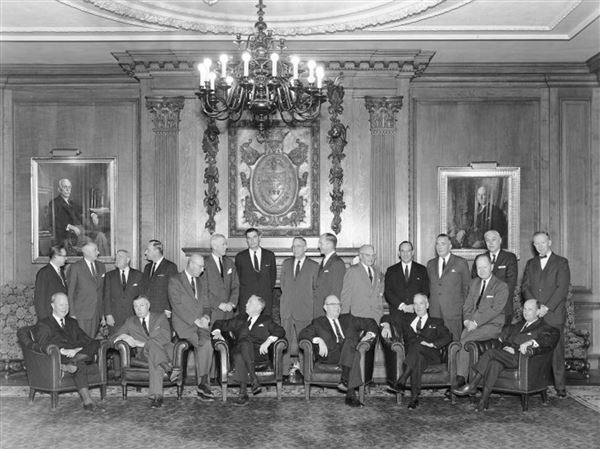Last night I read, probably for the last time, Ernest Hemingway's short story "The Snows of Kilimanjaro." It was a goodbye, or perhaps less terminally, a farewell.
I am in the process of re-reading, and bidding farewell, to some of the literary works that have been important to me during my 93 years of life. There will be some true goodbyes, like the funeral director's "last leave." And there will be those that will remain a part of me until the last great day.
I consult the antique Dewey Decimal System of the antique library of my antique mind and come up with candidates. Let's summon first the giants of the 20th century, whose long hard years my life spanned, almost in its entirety.
Last spring I re-read Thomas Mann's "The Magic Mountain," a masterpiece which today gets little notice. I read it first in the spring of 1942, when I was waiting for the Navy to call me up to Midshipmen's School at Notre Dame, an anxious time when I also was falling in love like a great tree crashing.
I previously had said farewell to other early 20th-century works. One was Theodore Dreiser's "An American Tragedy." I found it, after an interval of more than 70 years, to be rather poorly written but a powerful story of greed, ambition, lust and murder. The power remains.
Among the others were Flaubert's "Madame Bovary," which I consider to be the best love story ever written; Marcel Proust's glittering "Remembrance of Things Past"; Chaim Potok's "The Chosen"; Edith Wharton's "The Age of Innocence"; Margaret Mitchell's "Gone with the Wind"; and two plays, Eugene O'Neill's "Long Day's Journey into Night" and Arthur Miller's "Death of a Salesman." I reserve the right to return, if there is time, to Tolstoy's great "War and Peace" and Dostoevsky's "Crime and Punishment."
Next my path will wind through a thicket of Hemingway, beginning with "The Sun Also Rises," then "A Farewell to Arms," "For Whom the Bell Tolls" and that charmed memoir, "A Moveable Feast." I never felt comfortable with "The Old Man and the Sea." Excessively outre for me. But the saddest Hemingway farewell will be to "Islands in the Stream" because my copy of the book was inscribed to me by my mother.
I part less longingly with F. Scott Fitzgerald. I will make do with a re-read of "Tender Is the Night." I consider it his best, though everyone else chooses "The Great Gatsby."
From the 1930s there was Thomas Wolfe, who burned into my soul first with "Look Homeward, Angel," then "Of Time and the River," "The Web and the Rock" and "You Can't Go Home Again." That last will do nicely for my farewell to Wolfe.
Of the great World War II novels I most empathize with Herman Wouk's "The Caine Mutiny" because of my Navy service. It will receive a respectful farewell. But I am more devoted to Wouk's "This Is My God," a 1959 exegesis of the laws, customs and beliefs of Judaism. Certainly I will revisit Evelyn Waugh's "Brideshead Revisited," the best evocation of the World War II years in Britain, excepting only that superb TV series "Foyle's War."
On through the 20th century I search. I can find no others to which I will do my kind of farewell, not even John Updike, who I think has gone on too long.
Two others deserve my attention, though. One is William Faulkner, my prolix soulmate. I may chance to visit him in Yoknapatawpha County, in "The Sound and the Fury." The other is Toni Morrison, whom I never could understand, but whom I respect.
Now let us dip briefly into the 19th century. There are a few visits I might manage there, if not for a full dinner, then for tea with one sugar, and a scone. Those few are Emily Bronte's "Wuthering Heights" and her sister Charlotte's "Jane Eyre"; Stendahl's "The Charterhouse of Parma" and "The Red and the Black;" and the short stories and plays of Anton Chekhov. That leaves me un-Dickensed, un-Trolloped and un-Balzaced. So be it. I'm finished with them.
Among those to which I will not say farewell but always will keep with me are the King James Bible; the romantic poets -- Keats, Shelley, Byron and Wordsworth -- and Shakespeare's plays and sonnets.
As my farewells continue, lingering with me are the final lines of Thomas Wolfe's "You Can't Go Home Again" -- his own farewell:
Something has spoken to me in the night, burning the tapers of the waning year; something has spoken in the night, and told me I shall die, I know not where. Saying:
To lose the earth you know for greater knowing; to lose the life you have, for greater life; to leave the friends you loved, for greater loving; to find a land more kind than home, more large than earth.
Whereon the pillars of this earth are founded, toward which the conscience of the world is tending -- a wind is rising, and the rivers flow.
And so to all my lifelong friends-in-print I say farewell, au revoir, arrivederci, auf wiedersehen and do svidaniya.
And thanks.
First Published: January 3, 2009, 5:00 a.m.















